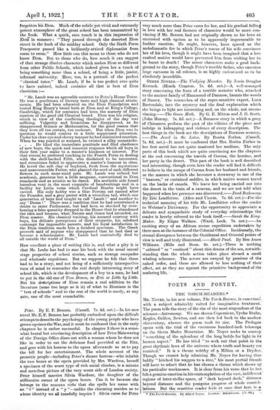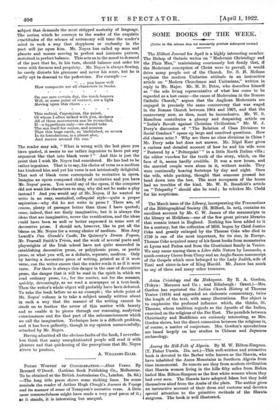POETS AND POETRY.
THE TORCH-BEARERS.*
Ma. Novas, in his new volume, The Torch-Bearers, is colmerned,. with a subject admirably suited for imaginative treatment...
The poem tells the story of the rise of the most stupendous of the sciences—Astronomy. We are shown Copernicus, Tycho Brahe, Kepler, Galileo, Newton, and are then led back to the modern
observatory, whence the poem took its rise. The Prolegua opens with the trial of the enormous hundred-inch telescope: on the Sierra Madre Mountains. Mr. Noyes seeks to convey. " something of the splendour_ of the long battle for light in its human aspect." He has tried- " to seek out that point in the great rhythmic laws of the universe where truth and beauty' are reunited." It is a theme *dithy. of I" Milton or a Dryden...
Though we cannot help admiring Mr. Noyes for having thus boldly "hitched his waggon to a star," his most partial friends
will have to admit. that he hag chosen a theme 'which shows up WS particular weaknesses. It is, clear from his verse that he has felt a genuine emotion in his contemplation of the vast, indifferent regions' of inter-stellar space, of " dark beyond dark," distance beyond distance and the pompous progress of whole constel- lations. But the sensitive reader feels at once that here is a,.
• The Toreh-Bearers. By Alfred Nape. London : Blackwood.- fie. 8d.J - • subject that demands the most stripped austerity of language. The notion which he conveys to the reader of the exquisite exactitudes of the science of astronomy will tune• the reader's mind in such a way that sloppiness or verbosity in the poet will jar upon him. Mr. Noyes has ealled up suns and planets and moons moving in perfect and intricate pattern, sustained in perfect balance. This sets us in the mood to demand of the poet that he, in his turn, should balance and order his verse with fineness and propriety. Mr. Noyes is always flowing, he rarely distorts his grammar and never his sense, but he is sadly apt to deecend to the pedestrian. For example :—
". . you know well How composite are all characters in books.
•
On one sure certain day, the torch-bearers Will, at some point of contact, see a light Moving upon this chaos . . .
This radical. Copernicus, the priest, Of whom I often talked with you, declares All of these movements can be reconciled,
If—a hypothesis only—we should take The sun itself for centre, and assume
That this huge earth, so 'stablished, so secure
In its foundations, is a planet also, And moves around the sun."
The reader may ask, " What is wrong with the last piece you hsve quoted, it seems to me rather ingenious to have put any argument like that into blank verse ? " And this is just the point that I wish Mr. Noyes had considered. He has had to be rather ingenious. That is to say, his choice of verse as a medium has hindered him and yet his verse is not intrinsically delightful. That sort of blank verse corresponds to recitative in opera.
Imagine an opera composed chiefly of recitative and you have Mr. Noyes' poem. You would say of the opera, if the composer did not want his characters to sing, why did not he make a play instead ? And you would say of Mr.. Noyes, if he wanted to write in an easy, unstudied, colloquial style—quite a proper aspiration—why did he not write in prose ? There are, of course, plenty of passages better than those I have quoted; some, indeed, that are finely imaginative, but it is always the ideas that are imaginative, never the versification, and the ideas
could have been as well or better expressed in some sort of decorative prose. I should not, however, like to put all the blame on Mr. Noyea for a wrong choice of- medium. Miss Amy Lowell's Can Grande's Castle, De Quincey's Dream Fugues, Mr. Pearsall Smith's Trivia, and the work of several poets and playwrights of the Irish school have not quite succeeded in establishing decorative prose, or polyphonic prose, or poetic prose, or what you will, as a definite, separate, medium. Only IT having a decorative piece of writing, printed as if it were-
verse, can the writer ensure that the reader reads it as if it were verse. For there is always this danger in the case of decorative prose, the danger that it will be read in the spirit in which we read ordinary prose, i.e., for the matter, not for the manner, quickly, devouringly, as we read a newspaper or a text-book. Then the writer's whole object will probably have been defeated. To take the book before us as an example ; the whole point of Mr. Noyes' volume is to take a subject usually written about in such a way that the manner of the writing cannot be dwelt on to feather the arrow of this matter with beauty and so enable it to pierce through our reasoning, analytical consciousness and fire that part of the subconsciousness which we call the imagination. Technique here is a difficult problem, and it has been gallantly, though in my opinion unsuccessfully, attacked by Mr. Noyes.
Having admitted all the obvious faults of the book, I neverthe- less think that many unsophisticated people will read it with pleasure and that quickening of the perceptions that Mr. Noyes strove to produce.
wrrs.rams-Ems.



































 Previous page
Previous page